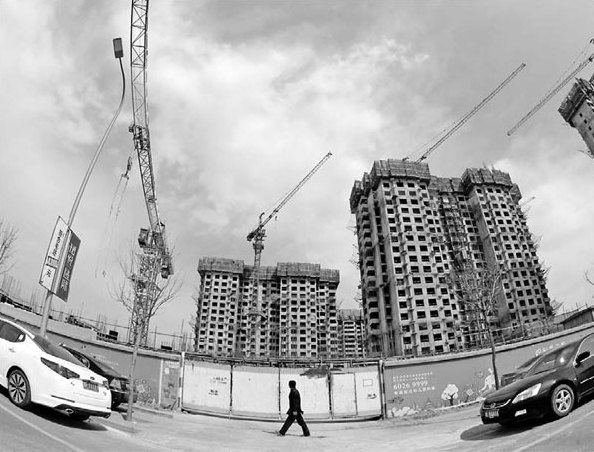Real estate sector at crossroads
Updated: 2013-06-05 05:54
By Hu Haiyan (China Daily)
|
||||||||
|
Buildings in Beijing being constructed by Poly Group. The group entered the real estate industry in 1992, and the revenue of its real estate unit accounted for nearly 90 percent of the group's 98 billion yuan in revenue last year. Provided to China Daily |
The Chinese real estate industry has reached a crossroads, and Han Qingtao is well aware of it.
The director of China Poly Group Corporation's real estate department - the second-largest real estate company in the country - said that it is crucial that Chinese real estate companies be in top form due to changing economic circumstances.
"The Chinese real estate industry was complicated in the past few years," Han said.
"But it's vital that the industry transforms itself, and quickly, if it hopes to establish itself, especially as the market cools."
China's GDP totaled 51.9 trillion yuan ($8.47 trillion) last year, according to figures from the National Statistics Bureau, and the value of real estate contracts amounted to 6.4 trillion yuan, about 10 percent of the nation's GDP.
"There's no doubt that real estate has become one of the country's pillar industries, and it's closely linked with other industries such as steel and iron," Han said.
However, the real estate market has cooled down since 2010, when the central government introduced policies such as higher downpayments and restrictions on third-home purchases to curb prices.
In March, a 20 percent capital gains tax was imposed on second-home sales.
Despite the challenges, many real estate developers say they expect more growth, particularly when the urbanization drive is intensified.
Wang Jianlin, chairman and founder of Dalian Wanda Group, said property prices will grow moderately over the next 10 years.
"As China's urbanization continues, there will be strong demand in the domestic real estate market over the next 10 years. A big drop in prices is unlikely. In fact, property prices will continue to rise, but growth will be limited because even stricter government policies are likely to be implemented," Wang said.
Han said that Poly Group regards the industry as critical to its development and is confident about its future.
"No doubt there will be turbulence in the market in the short term, but there is great potential in the long term," Han said.
The group entered the real estate industry in 1992, and the revenue of its real estate unit accounted for nearly 90 percent of the group's 98 billion yuan in revenue last year. Its home sales rose nearly 50 percent last year, making it the second-largest property developer, and accounting for 1.96 percent of the whole commercial residential building market.
Sales from Poly Group's real estate business rose five-fold from 2008 to 2012.
Han highlighted three areas that need attention if sound growth is to be maintained: building government-subsidized housing, tapping the markets in second-tier cities, and diversifying its mix of real estate products.
As a large-scale SOE, Poly Group says it will unswervingly assume its social responsibilities and support the government by actively taking part in the construction of government-subsidized housing.
By 2012, the group had 37 government-subsidized housing projects under construction throughout the country, with a construction area of 3.4 million square meters.
Poly Group is also already tapping the markets in second-tier cities, he added.
It has a presence in 25 provinces and 60 cities, and plans to increase its presence in more second-tier cities, such as Taiyuan, the capital of Shanxi province.
Diversifying Poly Group's real estate products is another way for the group to strengthen its real estate arm.
"Besides building residential property, we will develop other products such as urban complexes and combine functions of residential and entertainment housing, among other measures" Han said.
Although land is the main raw material for real estate companies, compliance with the government's macro-economic controls is also important.
The group's real estate business also enjoys advantages such as a good access to the capital market, Han said.
(China Daily 06/05/2013 page16)

 Michelle lays roses at site along Berlin Wall
Michelle lays roses at site along Berlin Wall
 Historic space lecture in Tiangong-1 commences
Historic space lecture in Tiangong-1 commences
 'Sopranos' Star James Gandolfini dead at 51
'Sopranos' Star James Gandolfini dead at 51
 UN: Number of refugees hits 18-year high
UN: Number of refugees hits 18-year high
 Slide: Jet exercises from aircraft carrier
Slide: Jet exercises from aircraft carrier
 Talks establish fishery hotline
Talks establish fishery hotline
 Foreign buyers eye Chinese drones
Foreign buyers eye Chinese drones
 UN chief hails China's peacekeepers
UN chief hails China's peacekeepers
Most Viewed
Editor's Picks

|

|

|

|

|

|
Today's Top News
Shenzhou X astronaut gives lecture today
US told to reassess duties on Chinese paper
Chinese seek greater share of satellite market
Russia rejects Obama's nuke cut proposal
US immigration bill sees Senate breakthrough
Brazilian cities revoke fare hikes
Moody's warns on China's local govt debt
Air quality in major cities drops in May
US Weekly

|

|








